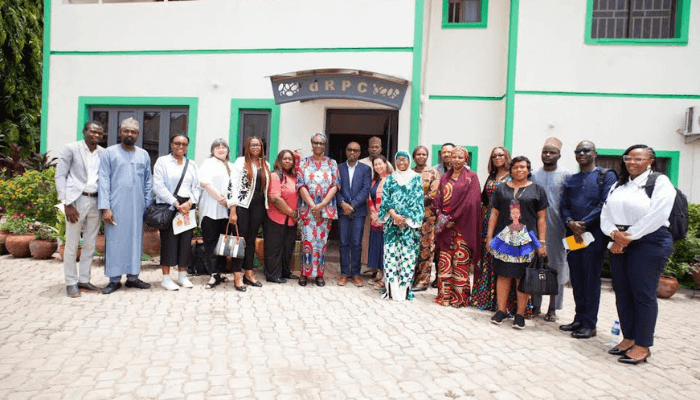…As Ford Foundation celebrates transformative impact of BUILD Initiative
The Ford Foundation Office for West Africa (OWA) recently welcomed Kimberly Bayer, deputy vice president for International Programs, and Victoria Dunning, director of the BUILD initiative, for a high-level visit. Their strategic engagement aimed to deepen partnerships and advance the Foundation’s commitment to strengthening resilient civil society institutions across West Africa.
The visit spotlighted the Foundation’s Building Institutions and Networks (BUILD) initiative– a flagship grantmaking approach designed to help social justice organisations grow stronger and more resilient over time. By providing grantees with five years of general operating support and targeted organisational strengthening support, BUILD equips partners with the strategic clarity, internal capacity, and long-term stability they need to achieve impact and drive systemic change over the course of years and decades.
The week-long visit, which spanned Abuja and Lagos, provided a valuable platform and opportunity to share learning and foster learning around institutional sustainability, and deepen engagement with the Foundation’s BUILD grantees and key regional partners, and staff. Each meeting served as an opportunity to review the progress of institutional strengthening efforts under the BUILD initiative, maximise the program’s impact, and explore new pathways for sustainability and innovation. Discussions focused on aligning strategies, agreeing on collaborative approaches, and outlining a clear path forward for the BUILD program within the West African context.
Speaking at the forum, Kimberly Bayer, Deputy Vice President for International Programs at the Ford Foundation, reaffirmed the organisation’s deep commitment to long-term, trust-based philanthropy.
BUILD, she noted, is Ford’s flagship investment in institutional strengthening, financing some of the foundation’s largest and most significant commitments globally since 2016. “BUILD is our version of trust-based philanthropy,” Bayer shared, highlighting the core values of mutual trust, equity, and shared learning that underpin the program and calling for this model to influence not just Ford’s future funding but the broader philanthropic sector.
Complementing Ms. Bayer, Judith-Ann Walker, executive director of the Development Research and Projects Centre (dRPC) said, “The BUILD grant didn’t just fund programs; it helped us build an institution. It has transformed the way our organisation thinks about sustainability, risk planning, and organisational strategy, and has given us the flexibility to formalise structures, plan long-term, and grow internal resilience.”
Walker added that one of dRPC’s biggest challenges has been ensuring that evidence-based research informs actual government policy rather than remaining on paper. “Through strategic partnerships and persistent engagement—capacities we’ve strengthened with support from the BUILD grant—we’re working to bridge that gap, so that data drives decisions and advocacy leads to real change,” she said. She emphasised that this approach is grounded in the organisation’s broader philosophy: “We’ve learned that true impact happens when we invest in relationships—with grassroots actors, local institutions, and cultural leaders who shape real-world outcomes.”
Reinforcing how much the BUILD initiative has driven expansion and structural growth, Rev. Fr. George Ehusani, Executive Director of the Lux-Terra Leadership Foundation, noted that “The BUILD grant has allowed us to grow in ways we never imagined—from restructuring our organisation internally to expanding our outreach across Nigeria. We’re not just changing minds—we’re transforming systems. Our vision is to establish ‘Centres of Excellence’ that are not only places of training but sanctuaries of safety, dignity, and transformation for generations to come. The BUILD initiative has taught us that our structural strength is as important as our spiritual mission. A sustainable institution with integrity will outlive its founders and serve society for decades.”
At a meeting with the Ford team in Lagos, Nigeria, Victoria Ibezim-Ohaeri, Director of Research and Policy at Spaces for Change (S4C), highlighted the transformative impact of the Ford Foundation’s BUILD grant on the organisation. “The BUILD grant has fundamentally shifted our operations—from reactive project-based work to a more strategic, focused, and scalable model,” she said.
Ibezim-Ohaeri credited the grant with enabling S4C to strengthen its governance architecture, expand regionally, and invest in long-term research and policy advocacy, noting, “We’ve built a governance system that ensures accountability and sustainability—something that project funding rarely supports.” Welcoming the newest BUILD partners to what she described as a global community of nearly 550 grantees across 47 countries, Victoria Dunning, director of the BUILD Program at the Ford Foundation, said: “BUILD is an opportunity to invest deeply—not only in your mission and programs, but in your institutional resilience, so you can navigate shifts in funding, leadership, strategy, and the broader world around you. Our partners are not only sustaining their institutions; they are reimagining what responsive, inclusive civil society looks like.”
She added that the results of Ford’s evaluation of the BUILD initiative are clear: “Multiyear, unrestricted funding—when combined with dedicated support for institutional development—leads to stronger, more resilient organisations of all sectors, structures, stages, and sizes. It also deepens their connection to the communities they serve.”

